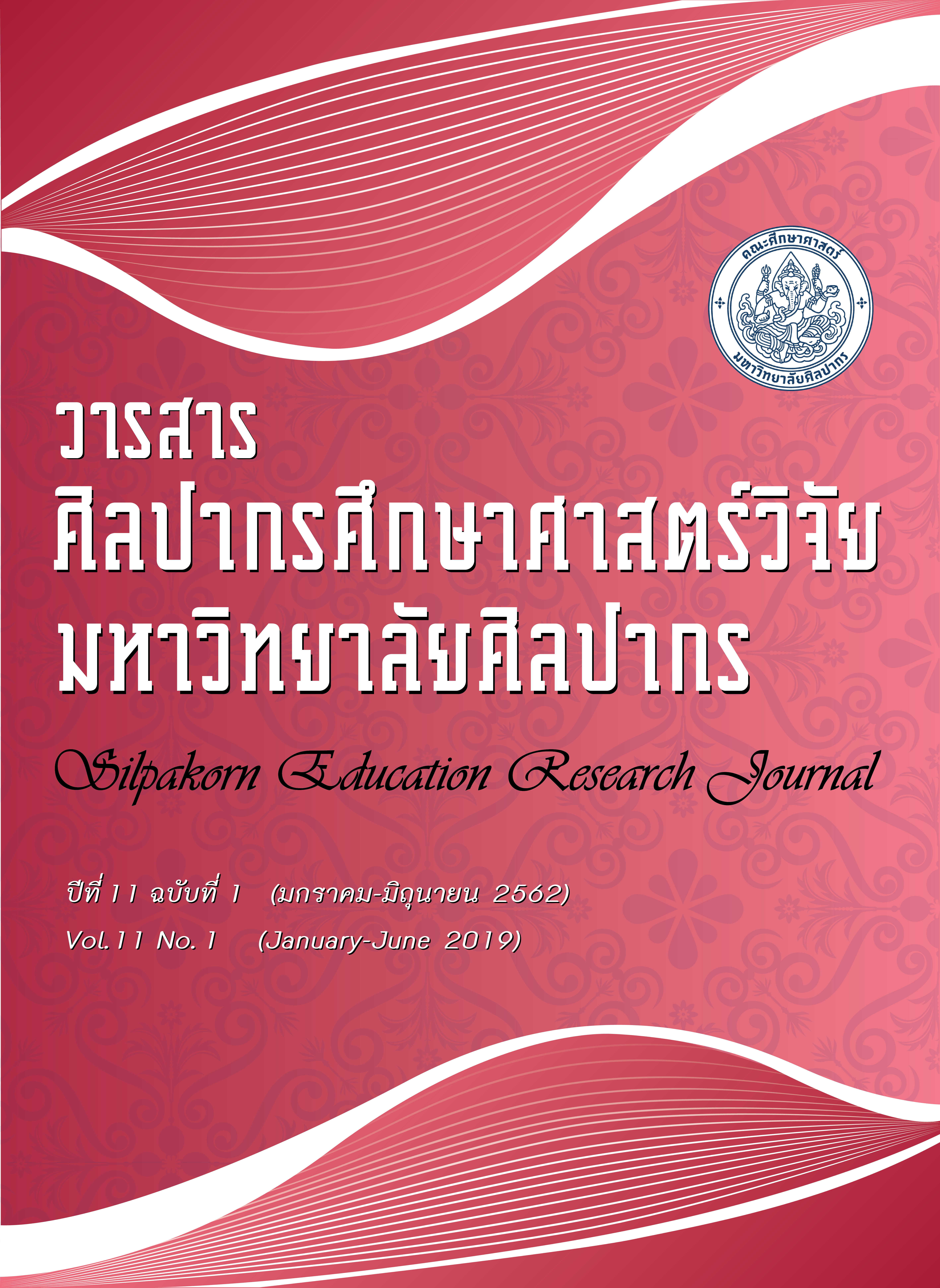การพัฒนากิจกรรมการเรียนรู้ตามแนวคิดห้องเรียนกลับด้านร่วมกับการโค้ชเพื่อส่งเสริมความสามารถในการสร้างเว็บไซต์ สำหรับนักเรียนชั้นมัธยมศึกษาปีที่ 3 (The Development of Learning Activities Based on Flipped Classroom with Coaching Method to Enhance Ability to Create Websites for ninth Grade Students)
Main Article Content
Abstract
Abstract
The objectives of this research were 1) develop and verify efficiency of learning activity based on flipped classroom with coaching for encouraging a creating website ability of grade 9 students. 2) study the effectiveness learning activity based on flipped classroom with developer coaching for Encouraging a creating website ability. A sample group were 40 grade 9students of Niwitratupatum School Kanchanaburi province by Sample random sampling. The research instruments were interview form, learning management manual, the ability of creating website assessment form, the questionnaire of student, journal writing. Statistical analysis employed were percent, mean, standard deviation, dependent t-test and content Analyzing.
The result of research
1.The Learning activity developed that called PICPE learning activity was composed of 5 steps 1) Prepare 2 ) Import into the lessons 3) Clarification 4) Practice 5) Evaluate the results. The efficiency of learning activity met the criterion of 80.77/80.94, that was higher than the required criterion.
2.The effectiveness of learning activity that students had ability for creating website after learnt more than criterion 60 percent at a .05 significance level and the students’ opinion toward learning activity at highest level.
Article Details
References
Ministry of Education. (2012). phrarātchabanyat kānsưksā hǣng chāt Phō̜.Sō̜. 2542.
læ thī kǣkhai phœ̄mtœ̄m 2545. phrō̜m kotmāi thī kīeokhō̜ng læ
phrarātchabanyat kānsưksā phāk bangkhap . Bangkok : Kurusapa Printing
Ladphrao.
กระทรวงศึกษาธิการ. (2545). พระราชบัญญัติการศึกษาแห่งชาติ พ.ศ.2542. และที่แก้ไขเพิ่มเติม
2545. พร้อมกฎหมายที่เกี่ยวข้องและพระราชบัญญัติการศึกษาภาคบังคับ.
กรุงเทพมหานคร: โรงพิมพ์คุรุสภาลาดพร้าว.
Lamsamang, C. (2013). “kānphatthanā rūpbǣp kān khōt thāng panyā bǣp phư̄an chūai
phư̄an phư̄a phatthanā samatthaphāp kān khōt læ kānčhatkān rīanrū thī
songsœ̄m kān khit wikhro̜ khō̜ng khrūphanitchayakam [The Development of
Peer Cognitive Coaching Model to Develop Coaching Competency and
Instructional Competency Enhancing Analytical Thinking Skill of Commercial
College Teachers]”. Silpakorn Educational Research Journal 5(2) : 134-150
จิตณรงค์ เอี่ยมสำอางค์. (2556). “การพัฒนารูปแบบการโค้ชทางปัญญาแบบเพื่อนช่วยเพื่อนเพื่อ
พัฒนาสมรรถภาพการโค้ช และการจัดการเรียนรู้ที่ส่งเสริมการคิดวิเคราะห์ของ
ครูพณิชยกรรม”. วารสารศิลปากรศึกษาศาสตร์วิจัย 5(2) : 134-150
Khammani, T. (2008). rūpbǣp kān rīan kānsō̜n thāng lư̄ak thī lāklāi. Bangkok :
chulalongkorn university press.
ทิศนา แขมมณี (2551). รูปแบบการเรียนการสอน ทางเลือกที่หลากหลาย. กรุงเทพมหานคร :
สำนักพิมพ์แห่งจุฬาลงกรณ์มหาวิทยาลัย.
Chanaupakara, P. (2015). “NPPC model : The professional development model for
the enhancement of coaching competency”. Veridian E-journal, Silpakon
University 8 (2) : 532-543
พนิดา จารย์อุปการะ. (2558 ). “NPPC model รูปแบบการพัฒนาวิชาชีพเพื่อเสริมสร้าง
สมรรถนะการโค้ช”. Veridian E-journal, Silpakon University 8 (2) : 532-543
Rachatatanakul, P. (2015). “kānphatthanā chut kānsō̜n sư̄ prasom rư̄ang patikiriyā khēmī
dūai kān čhatkān rīanrū bǣp sư̄pso̜ hākhwām rūrō̜wō̜ makap theknik KWLH
Plus dōi chai nǣokhit kānčhatkān rīanrū bǣp klap dān chan rīan phư̄a
phatthanā khwāmsāmāt nai kāntham khrōng ngān witthayāsāt læ
čhittawitthayā sāt khō̜ng nakrīan chan matthayommasưksā pī thī sī
[The development of multimedia instruction
package on Chemical Reactions by Inquiry Based Learning and KWLH Plus with
Flipped Classroom to development science project ability and scientific mind
for Matthayomsuksa 4 students]”. Veridian E-journal, Silpakon
University 8(1) : 319-332
พรรณวิภา รัชตธนกุล. (2558). “การพัฒนาชุดการสอนสื่อประสมเรื่องปฏิกิริยาเคมี ด้วยการ
จัดการเรียนรู้แบบสืบเสาะหาความรู้ร่วมกับเทคนิค KWLH Plus โดยใช้แนวคิดการจัดการ
เรียนรู้แบบกลับด้านชั้นเรียน เพื่อพัฒนาความสามารถ ในการทำโครงงานวิทยาศาสตร์และ
จิตวิทยาศาสตร์ของนักเรียนชั้นมัธยมศึกษาปีที่ 4. ”. Veridian E-journal, Silpakon
University 8(1) : 319-332
Hutasak, M. (2014). kānsāng khwāmrū khwāmkhaočhai krabūankān rīan
kānsō̜n. Found on 19 June 2016 from regis.rmutp.ac.th/km_regis
/stock/2557/2-57.ppt
มนัสนันท์ หัตถศักดิ์. (2557). การสร้างความรู้ความเข้าใจ กระบวนการเรียนการสอน. สืบค้นเมื่อวันที่
19 มิถุนายน 2559 จาก regis.rmutp.ac.th/ km_regis/stock/2557/2-57.ppt
Lamumnuaisuk, L. (2013). “kānsāng sư̄ bon ʻuppakō̜n khō̜mphiutœ̄ phokphā rư̄ang kān
khlư̄anwai nai rabop dičhitō̜n bư̄angton thī chai withīkān sō̜n bǣp hō̜ng rīan
klap dān [Creating media on mobile computer to be subject to the
introduction of digital animation using flipped classroom as a teaching
method]”. Master of Education Thesis of Science Department of Technology
Learn and communicate Graduate School King Mongkut’s University of
Technology Thonburi
ลัลน์ลลิต เอี่ยมอำนวยสุข. (2556). การสร้างสื่อบนอุปกรณ์คอมพิวเตอร์พกพา เรื่อง
การเคลื่อนไหวในระบบดิจิตอลเบื้องต้น ที่ใช้วิธีการสอนแบบห้องเรียนกลับด้าน.
วิทยานิพนธ์ปริญญาครุศาสตร์อุตสาหกรรมมหาบัณฑิต สาขาวิชาเทคโนโลยีการเรียนรู้และ
สื่อสารมวลชน บัณฑิตวิทยาลัย มหาวิทยาลัยเทคโนโลยีพระจอมเกล้าธนบุรี.
Kruekam-ai, W. (2009). “kānphatthanā rūpbǣp kān nithēt naksưksā fưk prasopkān
wichāchīp khrū phư̄a phatthanā samatthaphāp kānčhatkān rīanrū thī
songsœ̄m kān khit khō̜ng nakrīan prathom sưksā [The development of
supervision model for field experience student teachers to improve
instructional competency that enhances thinking skills of elementary school
students]”. Ph.D. thesis In Curriculum and Instruction Graduate School
Silpakorn University.
วชิรา เครือคำอ้าย. (2552). การพัฒนารูปแบบการนิเทศนักศึกษาฝึกประสบการณ์วิชาชีพครูเพื่อ
พัฒนาสมรรถภาพการจัดการเรียนรู้ที่ส่งเสริมการคิดของนักเรียนประถมศึกษา.
วิทยานิพนธ์ปรัชญาดุษฎีบัณฑิต สาขาวิชาหลักสูตรและการสอน บัณฑิตวิทยาลัย
มหาวิทยาลัยศิลปากร.
Panich, V. (2013). khrū phư̄a sit sāngha ʻong rīan klap thāng . 2nd Edition
Bangkok : SR PRINTING MASS PRODUCTS.
วิจารย์ พานิช. (2556). ครูเพื่อศิษย์สร้างห้องเรียนกลับทาง.พิมพ์ครั้งที่ 2 กรุงเทพมหานคร : เอสอาร์
พริ้นติ้งแมสโปรดักส์.
Wongyai, W., Phatphon. M. (2014). kān khōt phư̄a kān rūkhit ( Cognitive Coaching ).
Bangkok : Graduate School. Srinakharinwirot University.
วิชัย วงษ์ใหญ่ และมารุต พัฒผล. (2557). การโค้ชเพื่อการรู้คิด (Cognitive Coaching).
กรุงเทพมหานคร : บัณฑิตวิทยาลัย มหาวิทยาลัยศรีนครินทรวิโรฒ.
Office of the Education Council. (2012). khō̜sanœ̄ kanpatirū kānsưksā nai
satawat thī sō̜ng . (2009-2018) Office of the Education Council. 2011.
สำนักงานเลขาธิการสภาการศึกษา. (2555). ข้อเสนอการปฏิรูปการศึกษาในศตวรรษที่สอง.
(พ.ศ. 2552-2561) สำนักงานเลขาธิการสภาการศึกษา. 2554.
ภาษาต่างประเทศ
Bergman, J. and Sams, A. (2007). Flip Your Classroom: Reach Every Student in Every
Class Every Day.: International Society for Technology in Education.
Kaplan, R.S., and Norton, D.O. 1992. "The balanced scorecard – Measures that drive
performance." Harvard Business Review, 71ff, January–February 1992.
UNESCO. (2012). What is Intangible Cultural Heritage. Retrieved June 10, 2016, from
https://www.unesco.org/culture/ich/doc/src/01851-EN.pdf.
.

